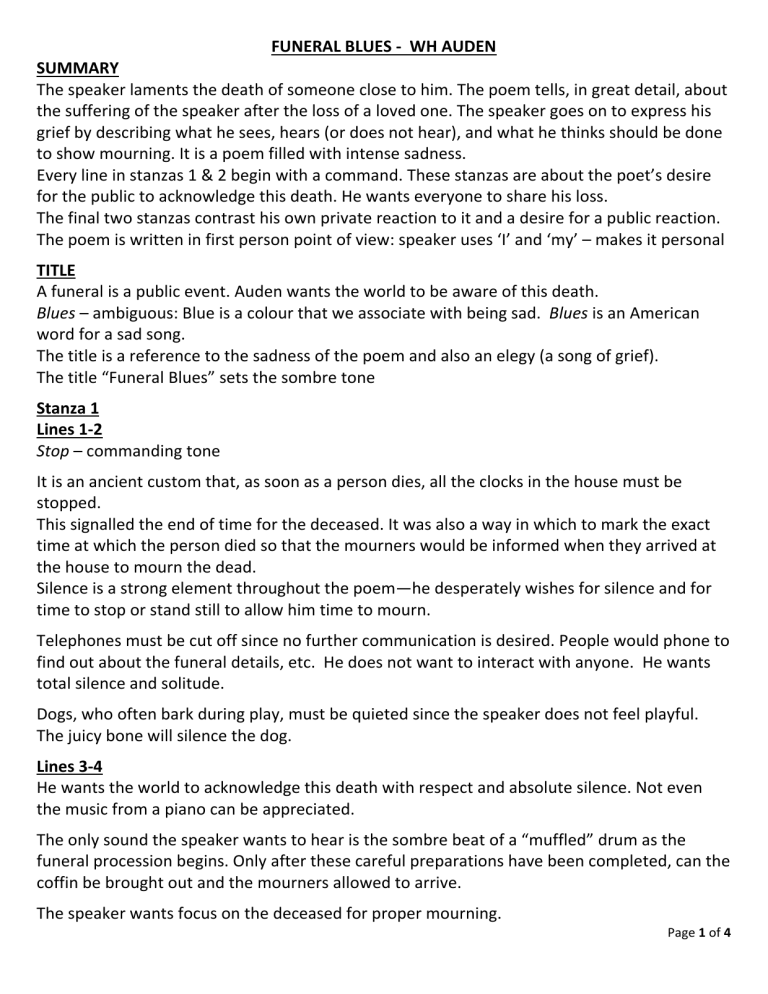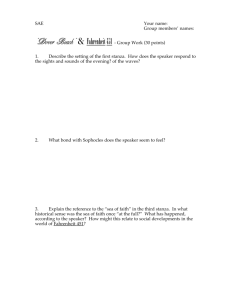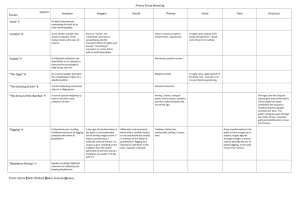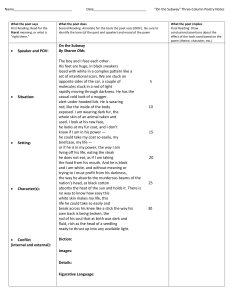
FUNERAL BLUES - WH AUDEN SUMMARY The speaker laments the death of someone close to him. The poem tells, in great detail, about the suffering of the speaker after the loss of a loved one. The speaker goes on to express his grief by describing what he sees, hears (or does not hear), and what he thinks should be done to show mourning. It is a poem filled with intense sadness. Every line in stanzas 1 & 2 begin with a command. These stanzas are about the poet’s desire for the public to acknowledge this death. He wants everyone to share his loss. The final two stanzas contrast his own private reaction to it and a desire for a public reaction. The poem is written in first person point of view: speaker uses ‘I’ and ‘my’ – makes it personal TITLE A funeral is a public event. Auden wants the world to be aware of this death. Blues – ambiguous: Blue is a colour that we associate with being sad. Blues is an American word for a sad song. The title is a reference to the sadness of the poem and also an elegy (a song of grief). The title “Funeral Blues” sets the sombre tone Stanza 1 Lines 1-2 Stop – commanding tone It is an ancient custom that, as soon as a person dies, all the clocks in the house must be stopped. This signalled the end of time for the deceased. It was also a way in which to mark the exact time at which the person died so that the mourners would be informed when they arrived at the house to mourn the dead. Silence is a strong element throughout the poem—he desperately wishes for silence and for time to stop or stand still to allow him time to mourn. Telephones must be cut off since no further communication is desired. People would phone to find out about the funeral details, etc. He does not want to interact with anyone. He wants total silence and solitude. Dogs, who often bark during play, must be quieted since the speaker does not feel playful. The juicy bone will silence the dog. Lines 3-4 He wants the world to acknowledge this death with respect and absolute silence. Not even the music from a piano can be appreciated. The only sound the speaker wants to hear is the sombre beat of a “muffled” drum as the funeral procession begins. Only after these careful preparations have been completed, can the coffin be brought out and the mourners allowed to arrive. The speaker wants focus on the deceased for proper mourning. Page 1 of 4 Stop/Prevent/Silence/Bring – these are a series of commands (imperatives) directing the world to cease activity and attend to this death Stanza 2 Lines 5-6 The capital “H” emphasises the importance of the deceased person. He was very important. Therefore, the poet wants the world to know about this death. He does not mention the name of the person, simply says “He”. He assumes that people will know who passed away. Dead is also capitalized, emphasizing the finality of death Scribble is writing that is done very quickly and untidily. He wants to the aeroplanes to very quickly announce the death to the world. He does not care if the writing is untidy. He wants everybody to know about the death as quickly as possible. moaning - Onomatopoeia - the sound of the engines of the aeroplane, makes it appear as if even the aeroplane is in torment/mourning at the news of the deceased. Lines 7-8 More demands: The crepe (light crinkled fabric) bows denote that the doves have been decorated in a show of mourning. They are "public doves" because they are the doves or pigeons which frequent the public places like parks or city squares. This emphasises that he wants a public show of grief. black cotton gloves – usually traffic policemen wear white gloves. Back is a sign of mourning. This intensifies the poet’s desire for the public to acknowledge this death. Stanza 3 Lines 9-10 The poet lists of ways in which the deceased was important to him. This person gave the speaker direction, filled his day and it was a joy conversing with him. This indicates that he was everything to him. He was my North, . . . West – Compass-points – indicates that the deceased meant the whole world to him. He gave the speaker direction and a sense of constancy. Oxymoron – emphasises that the deceased represented the whole world to the poet. Repetition of “my” indicates how important the deceased was to the poet. Contrast “working”/ “rest” – He was central to the poet both when working and not. He was an integral part of every moment of the speaker’s daily life. Lines 11-12 my noon, my midnight – he defined the poet’s sense of time my talk, my song – He influenced the speaker’s communication (my talk) and mood (my song). These lines suggest that he was, in fact, the speaker’s life. Page 2 of 4 The final line of this stanza expresses the genuine sorrow the speaker experiences over his loss and points to a growing sense of disillusionment. The speaker had previously believed that love eternal (that love would last for ever) but now admits, “I was wrong.” His beloved has died. This marked the end of love. He has great difficulty in accepting this loss. I was wrong – This is an anti-climax to the romantic idea, showing the poet’s disappointment. The use of the colon after ‘forever’ focuses attention on the idea that when we die, love dies. This creates the sense of the finality of death. He does not believe in the transcendence of love or the possibility of regaining that love after death. It emphasises the pessimism of the grieving poet. Stanza 4 Lines 13-14 put out – the poet returns to the earlier commanding/imperative tone. The poet singles out all those things in nature which are symbols of love/romance and time: the moon, the stars, the sun. With death, however, comes the end of love, and therefore there is no longer any point to the stars. His beloved has died, so too have the moon and the stars (figuratively). He wants them to be replaced by darkness and sorrow. The world would be plunged into total darkness - and that darkness would suit the depressed mood of the poet. The hyperbole emphasises his sense of futility/ despair. Lines 15-16 The ceremony so carefully constructed by the speaker in the first two stanzas does not seem to be enough to express or reflect his intense grief. As a result, the speaker expresses a desire to alter the universe. The ocean and the woods too represent the beauty of nature which is especially appreciated by people in love. He continues to ask for the impossible: all these things must vanish as the poet mourns the loss of his loved one. oceans and wood – represent the land and the sea – he wants it all to disappear. He wants the world to come to an end because his world has ended. Hyperbole – indicates the absolute depths of the poet's sorrow, his intense grief and despair. Romantic images—are painful. He wants to blot out everything except mourning. Final line is simple and harsh – shows the pessimism/despair of the grieving poet. An elegy usually has some hope for the future/small moment of optimism. With this poem, there is no light at the end of the tunnel. Page 3 of 4 THEMES Stanzas Contrasting Themes Public vs. private (Stanza 1+2) Intimate vs. Distant (Stanza 3+4) Death The devastating effects that the death of a loved one, has on those left behind. He is heartbroken and cannot see the good in anything now that his loved one has died. He feels life is pointless without him. Love Auden’s poem contradicts the romantic notion of love lasting through eternity. In this poem, the loss of love is final. Order and Disorder When we lose a loved one who provided a sense of meaning and order, chaos can result. The speaker feels a sense of disorder as a result of losing a relationship that was such an integral part of his life. TONE The tone of the first two stanzas is commanding and forceful; the speaker uses the imperative mode “stop all the clocks.” He commands that people pay attention to the deceased; pay respects The tone in the third stanza is nostalgic “he was my working week and my Sunday rest” as the speaker remembers what it was like when the deceased was alive The tone of the final stanza is forceful and irrational: the speaker requests outlandish tasks to be performed The tone of the final stanza is also melancholic and cynical “nothing now can ever come to any good” Other words: Intense grief, anger, bitterness, sorrow MOOD Sadness/empathy QUESTIONS 1. To whom does the speaker address his poem? Refer to the poem for proof. What's the effect of this point of view? (4) 2. What is the effect of all of the poem's hyperbole? Does it make the speaker's grief seem more or less intense? Give reasons for your answers. (4) 3. Why does the speaker make so many references to the natural world? What's the effect of all the references to the moon and stars, etc.? (4) 4. Comment on the suitability of the title? (3) Page 4 of 4



